Unit 2 I‘ll help to clean up the city parks.-Grammar Focus-4c (课件)(共有PPT49张)
文档属性
| 名称 | Unit 2 I‘ll help to clean up the city parks.-Grammar Focus-4c (课件)(共有PPT49张) | 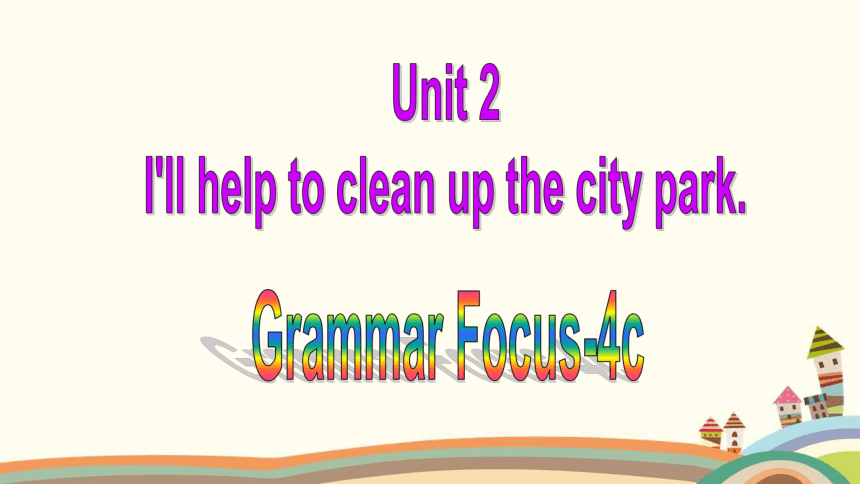 | |
| 格式 | ppt | ||
| 文件大小 | 732.5KB | ||
| 资源类型 | 教案 | ||
| 版本资源 | 人教新目标(Go for it)版 | ||
| 科目 | 英语 | ||
| 更新时间 | 2022-04-06 14:53:57 | ||
图片预览

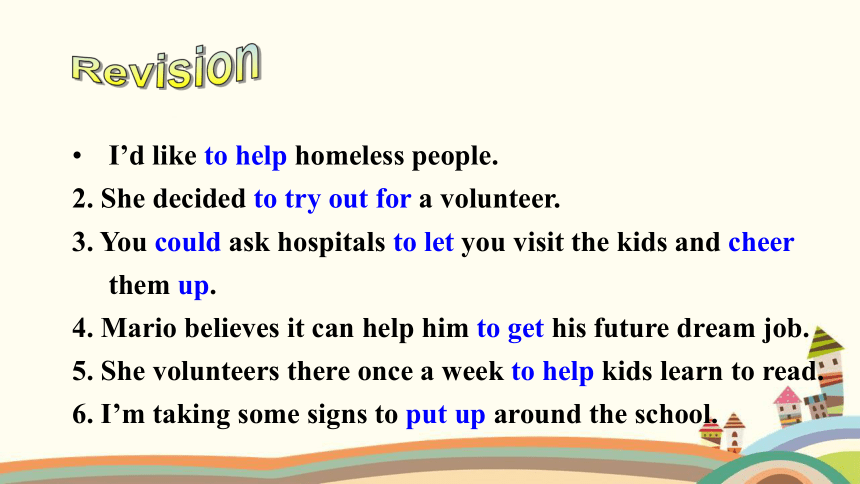
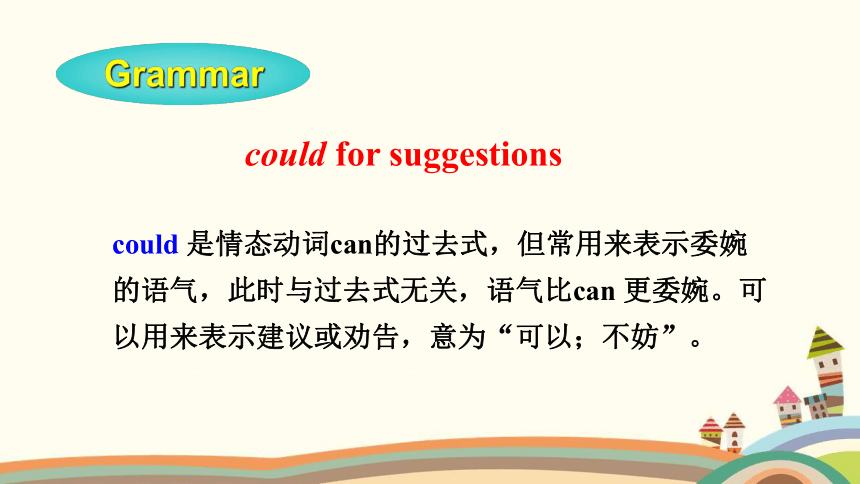
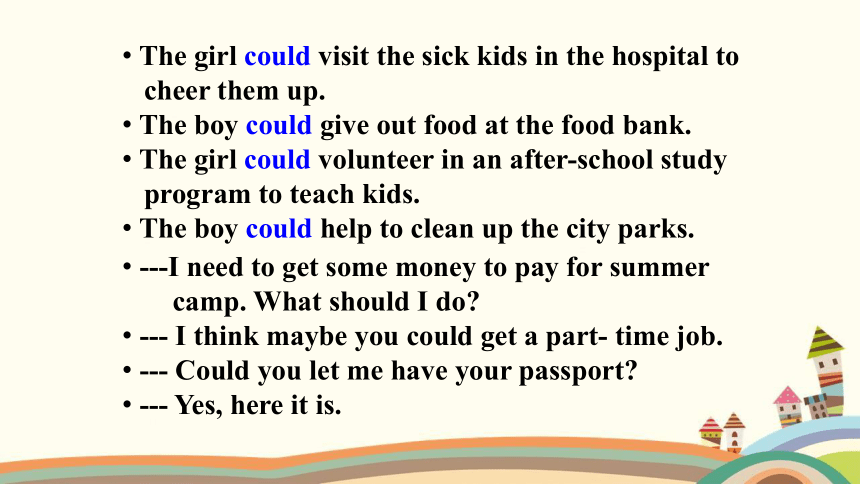
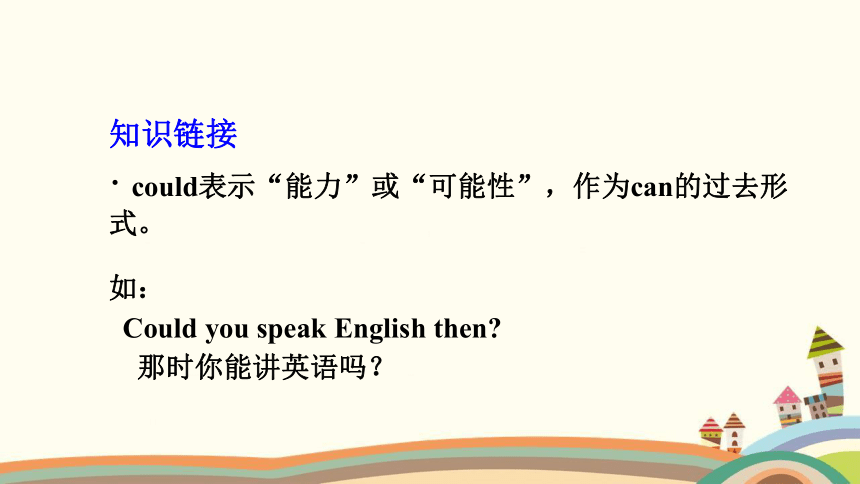
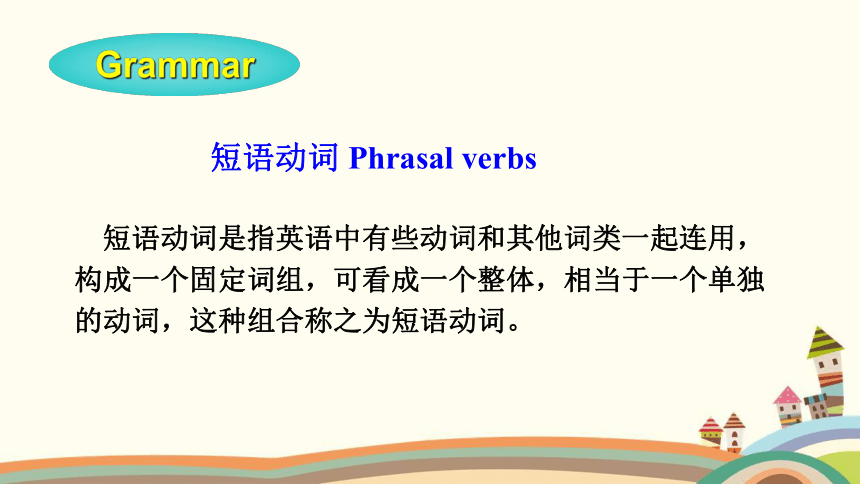
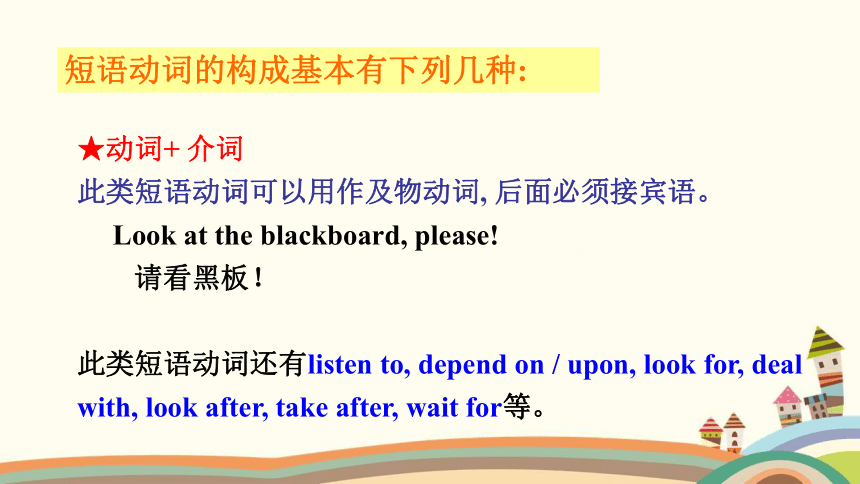
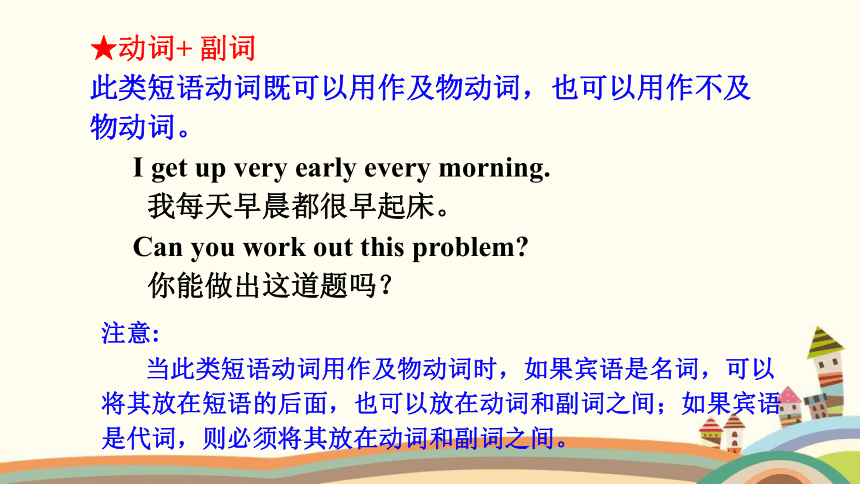
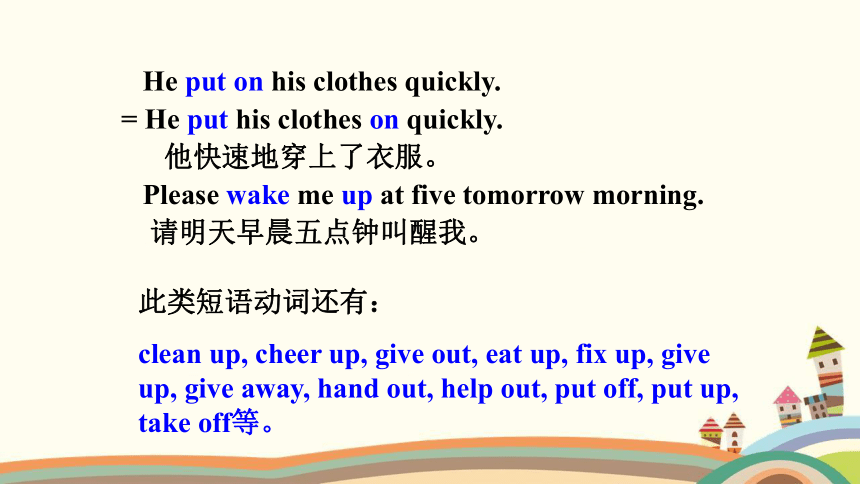
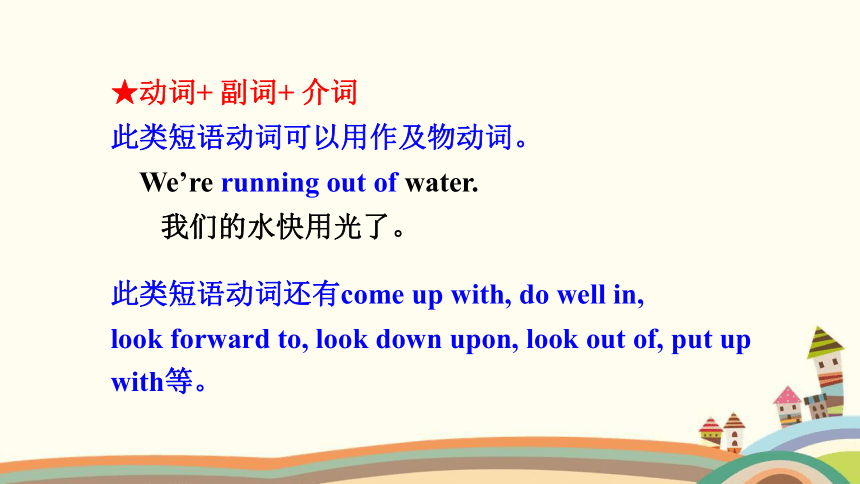
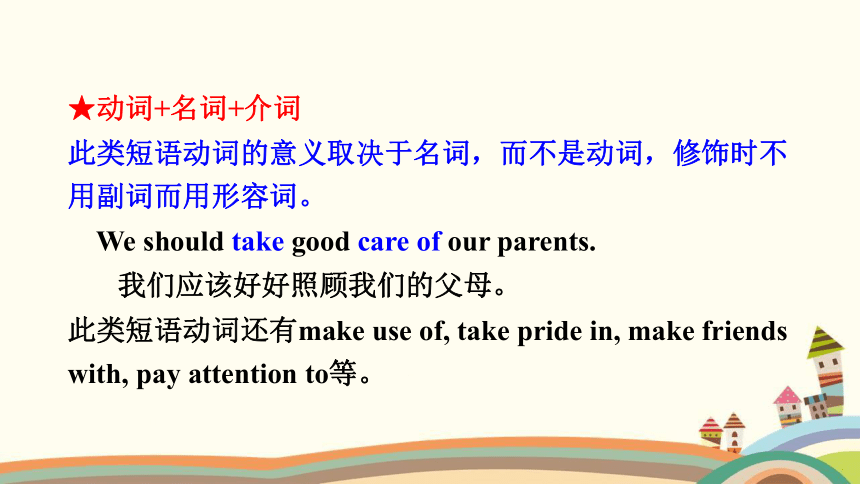
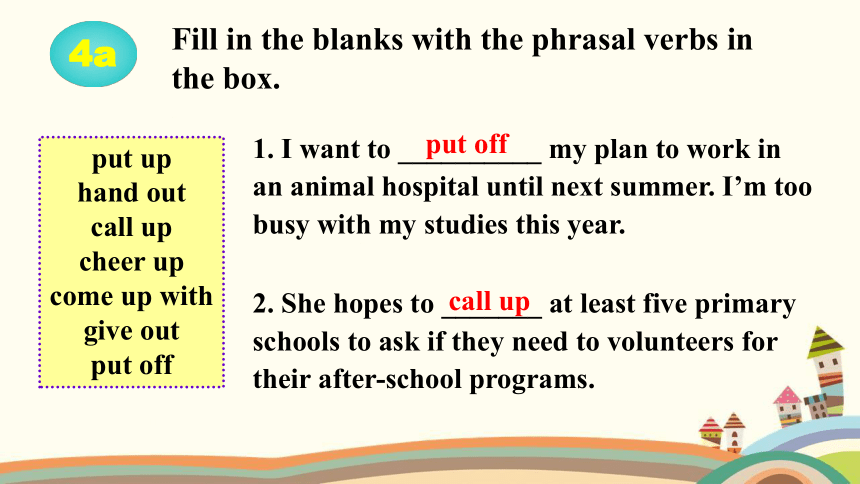
文档简介
(共49张PPT)
I’d like to help homeless people.
2. She decided to try out for a volunteer.
3. You could ask hospitals to let you visit the kids and cheer them up.
4. Mario believes it can help him to get his future dream job.
5. She volunteers there once a week to help kids learn to read.
6. I’m taking some signs to put up around the school.
could 是情态动词can的过去式,但常用来表示委婉的语气,此时与过去式无关,语气比can 更委婉。可以用来表示建议或劝告,意为“可以;不妨”。
could for suggestions
Grammar
---I need to get some money to pay for summer
camp. What should I do
--- I think maybe you could get a part- time job.
--- Could you let me have your passport
--- Yes, here it is.
The girl could visit the sick kids in the hospital to
cheer them up.
The boy could give out food at the food bank.
The girl could volunteer in an after-school study
program to teach kids.
The boy could help to clean up the city parks.
知识链接
· could表示“能力”或“可能性”,作为can的过去形式。
如:
Could you speak English then
那时你能讲英语吗?
短语动词 Phrasal verbs
Grammar
短语动词是指英语中有些动词和其他词类一起连用,构成一个固定词组,可看成一个整体,相当于一个单独的动词,这种组合称之为短语动词。
★动词+ 介词
此类短语动词可以用作及物动词, 后面必须接宾语。
Look at the blackboard, please!
请看黑板!
此类短语动词还有listen to, depend on / upon, look for, deal with, look after, take after, wait for等。
短语动词的构成基本有下列几种:
★动词+ 副词
此类短语动词既可以用作及物动词,也可以用作不及物动词。
I get up very early every morning.
我每天早晨都很早起床。
Can you work out this problem
你能做出这道题吗?
注意:
当此类短语动词用作及物动词时,如果宾语是名词,可以将其放在短语的后面,也可以放在动词和副词之间;如果宾语是代词,则必须将其放在动词和副词之间。
He put on his clothes quickly.
= He put his clothes on quickly.
他快速地穿上了衣服。
Please wake me up at five tomorrow morning.
请明天早晨五点钟叫醒我。
此类短语动词还有:
clean up, cheer up, give out, eat up, fix up, give up, give away, hand out, help out, put off, put up, take off等。
★动词+ 副词+ 介词
此类短语动词可以用作及物动词。
We’re running out of water.
我们的水快用光了。
此类短语动词还有come up with, do well in,
look forward to, look down upon, look out of, put up with等。
★动词+名词+介词
此类短语动词的意义取决于名词,而不是动词,修饰时不用副词而用形容词。
We should take good care of our parents.
我们应该好好照顾我们的父母。
此类短语动词还有make use of, take pride in, make friends with, pay attention to等。
4a
Fill in the blanks with the phrasal verbs in the box.
1. I want to __________ my plan to work in an animal hospital until next summer. I’m too busy with my studies this year.
2. She hopes to _______ at least five primary schools to ask if they need to volunteers for their after-school programs.
put up
hand out
call up
cheer up
come up with
give out
put off
put off
call up
put up
hand out
call up
cheer up
come up with
give out
put off
3. Our class is trying to ________________ some ideas to __________ sick children because they are often sad.
4. We decided to ________ signs around the school and __________ notices to tell students about the book sale. We will __________ the money from the sale to homeless people.
come up with
cheep up
put up
hand out
give out
put up 张贴;搭建
He put up some signs asking for old bikes.
他张贴了一些寻求旧自行车的告示。
They quickly put up a tent.
他们迅速地搭建了一个帐篷。
put off 推迟;拖延
We can’t put off making a plan.
我们不能推迟制订计划。
(1)put off “推迟;拖延”,是由“动词+副词”构成的短语动词,其后可接名词、代词或动词-ing形式作宾语。
(2)当代词作宾语时,要放在动词和副词中间。类似的短语动词还有:put up, fix up, call up, cheer up, write down, give out, hand out等。
根据句意及括号内的汉语提示,用短语的正确形式填空。
1. Can’t you _______ _______ (想出) a better excuse than that
2. Your desks are too dirty. You should _______ _______ ______
(打扫它们) at once.
3. The school has _______ ______ (开办) a special class to help
poor readers.
think up
clean
them up
set up
4. We should try our best to _______ _____ ___ (使她开心起来).
5. Who can ______ _____ _____ (想出) a good idea for our party
6. The teacher _______ ______ (挂起) a Chinese map on the wall of
the classroom yesterday.
7. There are some people _________________ _____ (分发) papers
at the shopping center every day.
cheer her up
come up with
put up
giving / handing out
hang out write down hand out take after fix up work out ask for run out of take away from
根据句意,从方框中选择正确的短语,并用其正确形式填空。
1. Don’t worry. I will help you _______ your computer.
2. The problem is too difficult for me to __________.
3. Who is helping the teacher _________ the students’ homework
4. I have two children. My son looks like me and my daughter __________ her mother.
fix up
work out
hand out
takes after
5. Please wait a minute! I’ll get a pen to __________ your
telephone number.
6. If you have any problems, you can ________ help.
7. These books mustn’t ___________________ the library.
8. I like ________________________ with my friends after school.
9. Have you ____________ all of your money
write down
ask for
be taken away from
hanging out / to hang out
run out of
hang out write down hand out take after fix up work out ask for run out of take away from
动词不定式
Infinitive
Grammar
当我们要表示“想做某事、需要做某事或决定做某事”时,就会出现两个动词连用的情况,这时应如何表达呢?
同学们自然会想到 want to do sth., need to do sth.和 decide to do sth. 等表达方式。
主要行为动词后面的动词采用“to+动词原形”的结构,我们把这种结构称为动词不定式(有时可以不带to)。动词不定式没有人称和数的变化,在句子中不能作谓语。下面我们一起来看一下动词不定式有哪些语法功能。
1. 什么是动词不定式?
1. 不定式作宾语
动词不定式作动词的宾语。
学习不定式作宾语时,要注意掌握后接不定式作宾语的动词。
常见动词有: want, hope, wish, like, begin, try, agree, help 等。
Many people decide not to think about it.
许多人决定不去想这件事。
I want to go to the library. 我想去图书馆。
2. 动词不定式的主要语法功能:
动词 + to do sth.的固定搭配:
want to do sth. decide to do sth.
hope to do sth. plan to do sth.
offer to do sth. agree to do sth.
learn to do sth. ask sb. to do sth.
tell sb. to do sth. want sb. to do sth.
invite sb. to do sth.
He’ll use what he has ______ her a new dress. A. bought B. to buy
C. buying D. been bought
2. Mother asks me _______ computer games before finishing my homework.
A. not play B. to play
C. not to play D. to not play
B
C
2) 动词不定式作形容词的宾语。
这类形容词有: able, afraid, angry, careful, easy等。
I am very happy to meet you. 我见到你很高兴。
She is afraid to walk at night.她害怕走夜路。
It is easy to understand the cartoon.
看懂这部卡通片很容易。
3) 动词不定式作介词but和except的宾语。
介词之前有行为动词do或它的其它形式时,不定式符号to通常被省略。
He had no choice but to sit there as usual.
他没有什么选择,只好像往常一样坐在那儿。
I have no other wish except to pass the examination .
我除了要通过考试之外,没有别的心愿。
He can’t do anything but wait for me there.
他什么也不能做,只好在那等我。
( ) 1. He wants ______ some vegetables.
A. buy B. buying C. to buy D. buys ( ) 2. Don't forget ______ your homework with you when you come to school.
A. to bring B. bringing
C. to take D. taking
( ) 3. He found it very difficult ______.
A. sleeping B. sleeps
C. slept D. to fall asleep
C
A
D
2. 动词不定式做宾语补足语
不定式做宾语补足语是对宾语的补充说明。
1)带to的动词不定式作宾语补足语的动词主要有:要求、允许、提议(ask, allow, advise),期望、邀请、鼓励 (expect, invite, encourage),教导、告诉、想要 (teach, tell, want),等待、希望、愿意(wait for, wish, would like / love)。如:
I’d invite her to have dinner at my house.
We should allow the children to choose their own clothes.
2)不带to的不定式作宾补
在主动句里,动词不定式在使役动词 (make, let, have)或感官动词 (feel, listen to, hear, look at, see, watch, notice)之后作宾补时,不定式需省去to。包括四“看”:look at, observe, see, watch;三“让”:have, let, make;二“听”:hear, listen to;一“感觉”:feel;一“注意”:notice。如:
I felt someone open my door.
我感觉有人开了我的门。
Please listen to me sing the song again.
请听我把这首歌再唱一遍。
You can’t let the boy stand in the sun.
你不能让那孩子站在太阳底下。
You must watch me carefully do everything.
你必须仔细观察我所做的一切。
注意:
感官动词后既可跟省略to的不定式作宾补,也可跟现在分词作宾补。其区别是:前者强调动作的全过程或经常性;后者则强调动作在进行(片断)。试比较:
I heard her sing.
我听见她唱了歌。
I heard her singing.
我听见她正在唱歌。
3)带to或不带to的不定式作宾补
动词help后接动词不定式作补语,to可带可不带。
They can help you to learn English.
Using email English helps you write quickly.
4)不定式做宾语补足语时,如果要表达否定的意思,要在to do前加not,构成not to do的形式。
Tom told me not to touch anything.
Mother asked us not to make too much noise.
3. 不定式作状语
不定式常常作目的状语、原因状语、结果状语等。
不定式作状语时,要注意不定式的逻辑主语应与句子的主语保持一致。
I came to Beijing to see my grandpa.
我来北京看望我爷爷。
I’m glad to meet you! 很高兴见到你!
I’m too tired to walk. 我太累了,走不动了。
1)目的状语
如果想要表达“做某事是为了什么”,可以用动词不定式表示目的,作目的状语。不定式做目的状语时,可以放在句首,也可以放在句尾。置于句首时常表示强调。如:
In order to catch the early bus, she got up very early.
A group of young people got together to discuss this question.
She came to this city to visit her daughter.
2)原因状语
多见于“sb.+be+adj.+to do...”结构句中。如:
I feel very lucky to have him.
He ran out of money to buy old bikes.
3)结果状语
多见于“too ... To”“enough to ...”结构句中。
I’m too tired to do it well.
The room is big enough for three people to live in.
4b
Fill in the blanks with the correct forms of the verbs in the box.
help move do make visit spend
Most people today are only worried about getting good jobs _________ lots of money. In their free time, they think about what _______ for fun. However, few people think about what they can do _________ others.
to make
to do
to help
There are many people who are less lucky than us. Volunteering our time to help these people is a good way _________ our free time. For example, we can make plans __________ sick children in the hospital or raise money for homeless people. Some people even stop doing their jobs for a few months or a year _________ to another place, like one of the countries in Africa, and help people there.
to spend
to visit
to move
1. I’d like to volunteer __________________________
_____________________________________________.
2. At 12:00 a.m., I called my friend _______________
_____________________________________________.
3. I’m very busy but I could help _________________
______________________________________________.
to paint the
house for a few hours tomorrow
to ask him an
important question
at the food bank and help
to give out food to the homeless people
4c
Complete the sentences with your own ideas. Use infinitives.
4. Summer vacation is coming, and I want ______________________________________.
5. I want to travel alone. My parents told me _______________________________________
_______________________________________.
to visit my grandparents in Hunan
not to do that because I am too young
and it is not safe
( ) Our English teacher wants us _______ English stories out of class.(2017·四川成都)
A. read B. reading C. to read
( ) —The lights is on. When you leave, please ________. (2017·齐齐哈尔)
— OK, I won’t forget ________it.
A. turn it off; to do B. turn off it ; doing
C. turn on it; to do
C
A
( ) Tom has decided _____ a part--time job after he graduates from school. (2016·四川攀枝花)
A. do B. to do C. did D. doing
B
( ) The Chinese team are working hard _____ honors in the 2016 Olympic Games. (2016·湖南株洲)
A. to win B. win C. winning
A
( ) My parents didn’t allow me _____ to the party. (2015天津)
A. go B. to go C. Goes D. went
B
( ) Mr. Smith told his son _____ the football match because of the exam. (2015呼和浩特)
A. not to watch B. to not watch
C. not watching D. doesn’t watch
A
( )(成都中考)Our English teacher wants us _____
English stories out of class.
A.read B.reading C.to read
( ) (河南中考)The boss asked Tim to go and _____ out
if there was anyone else absent.
A.find B.finding C.to find D.found
C
A
( ) She came here ________ her grandparents.
A.visit B.to visit C.visiting D.Visited
( )Xiong'an New Area will help ________ big problems
in Beijing,such as traffic jams.
A.set out B.check out
C.work out D.give out
B
C
一、用括号内所给单词的适当形式填空。
1.Don't forget __________ (lock) the door when you leave.
2.Would you like ________ (go) and have a picnic with us tomorrow
3.I often hear the girl _______ (play) the piano in the next room.
4.Can we ______ (put) off the meeting till next Monday morning
5.Would you please _______ (give) out the exam papers
to lock
to go
play
put
give
三、用括号内所给单词的适当形式填空,使短文完整、通顺。
Yesterday my sister and I went 1. _________ (buy) something for her birthday.She didn't really know what 2. __________ (get) but she seemed 3. _________ (like) the idea of a pet,so we went to the nearest pet shop.She started 4. _________________ (look) around at all the animals.The man in the shop advised her 5. ______________ (choose) the rabbits, but when she saw some puppies 6. ____________ (play) in the box, she said she would like 7. _____________ (have) one of them.
to buy
to get
to like
to look/looking
to choose
playing
to have
I didn't know if we had enough money 8._________ (buy) one and I hoped my mother would want us 9._____________ (have) a dog in the house, but my sister promised 10.____________ (look) after it well and we had enough money, so we bought a little brown dog.
to buy
to have
to look
1. Do the other exercises.
I’d like to help homeless people.
2. She decided to try out for a volunteer.
3. You could ask hospitals to let you visit the kids and cheer them up.
4. Mario believes it can help him to get his future dream job.
5. She volunteers there once a week to help kids learn to read.
6. I’m taking some signs to put up around the school.
could 是情态动词can的过去式,但常用来表示委婉的语气,此时与过去式无关,语气比can 更委婉。可以用来表示建议或劝告,意为“可以;不妨”。
could for suggestions
Grammar
---I need to get some money to pay for summer
camp. What should I do
--- I think maybe you could get a part- time job.
--- Could you let me have your passport
--- Yes, here it is.
The girl could visit the sick kids in the hospital to
cheer them up.
The boy could give out food at the food bank.
The girl could volunteer in an after-school study
program to teach kids.
The boy could help to clean up the city parks.
知识链接
· could表示“能力”或“可能性”,作为can的过去形式。
如:
Could you speak English then
那时你能讲英语吗?
短语动词 Phrasal verbs
Grammar
短语动词是指英语中有些动词和其他词类一起连用,构成一个固定词组,可看成一个整体,相当于一个单独的动词,这种组合称之为短语动词。
★动词+ 介词
此类短语动词可以用作及物动词, 后面必须接宾语。
Look at the blackboard, please!
请看黑板!
此类短语动词还有listen to, depend on / upon, look for, deal with, look after, take after, wait for等。
短语动词的构成基本有下列几种:
★动词+ 副词
此类短语动词既可以用作及物动词,也可以用作不及物动词。
I get up very early every morning.
我每天早晨都很早起床。
Can you work out this problem
你能做出这道题吗?
注意:
当此类短语动词用作及物动词时,如果宾语是名词,可以将其放在短语的后面,也可以放在动词和副词之间;如果宾语是代词,则必须将其放在动词和副词之间。
He put on his clothes quickly.
= He put his clothes on quickly.
他快速地穿上了衣服。
Please wake me up at five tomorrow morning.
请明天早晨五点钟叫醒我。
此类短语动词还有:
clean up, cheer up, give out, eat up, fix up, give up, give away, hand out, help out, put off, put up, take off等。
★动词+ 副词+ 介词
此类短语动词可以用作及物动词。
We’re running out of water.
我们的水快用光了。
此类短语动词还有come up with, do well in,
look forward to, look down upon, look out of, put up with等。
★动词+名词+介词
此类短语动词的意义取决于名词,而不是动词,修饰时不用副词而用形容词。
We should take good care of our parents.
我们应该好好照顾我们的父母。
此类短语动词还有make use of, take pride in, make friends with, pay attention to等。
4a
Fill in the blanks with the phrasal verbs in the box.
1. I want to __________ my plan to work in an animal hospital until next summer. I’m too busy with my studies this year.
2. She hopes to _______ at least five primary schools to ask if they need to volunteers for their after-school programs.
put up
hand out
call up
cheer up
come up with
give out
put off
put off
call up
put up
hand out
call up
cheer up
come up with
give out
put off
3. Our class is trying to ________________ some ideas to __________ sick children because they are often sad.
4. We decided to ________ signs around the school and __________ notices to tell students about the book sale. We will __________ the money from the sale to homeless people.
come up with
cheep up
put up
hand out
give out
put up 张贴;搭建
He put up some signs asking for old bikes.
他张贴了一些寻求旧自行车的告示。
They quickly put up a tent.
他们迅速地搭建了一个帐篷。
put off 推迟;拖延
We can’t put off making a plan.
我们不能推迟制订计划。
(1)put off “推迟;拖延”,是由“动词+副词”构成的短语动词,其后可接名词、代词或动词-ing形式作宾语。
(2)当代词作宾语时,要放在动词和副词中间。类似的短语动词还有:put up, fix up, call up, cheer up, write down, give out, hand out等。
根据句意及括号内的汉语提示,用短语的正确形式填空。
1. Can’t you _______ _______ (想出) a better excuse than that
2. Your desks are too dirty. You should _______ _______ ______
(打扫它们) at once.
3. The school has _______ ______ (开办) a special class to help
poor readers.
think up
clean
them up
set up
4. We should try our best to _______ _____ ___ (使她开心起来).
5. Who can ______ _____ _____ (想出) a good idea for our party
6. The teacher _______ ______ (挂起) a Chinese map on the wall of
the classroom yesterday.
7. There are some people _________________ _____ (分发) papers
at the shopping center every day.
cheer her up
come up with
put up
giving / handing out
hang out write down hand out take after fix up work out ask for run out of take away from
根据句意,从方框中选择正确的短语,并用其正确形式填空。
1. Don’t worry. I will help you _______ your computer.
2. The problem is too difficult for me to __________.
3. Who is helping the teacher _________ the students’ homework
4. I have two children. My son looks like me and my daughter __________ her mother.
fix up
work out
hand out
takes after
5. Please wait a minute! I’ll get a pen to __________ your
telephone number.
6. If you have any problems, you can ________ help.
7. These books mustn’t ___________________ the library.
8. I like ________________________ with my friends after school.
9. Have you ____________ all of your money
write down
ask for
be taken away from
hanging out / to hang out
run out of
hang out write down hand out take after fix up work out ask for run out of take away from
动词不定式
Infinitive
Grammar
当我们要表示“想做某事、需要做某事或决定做某事”时,就会出现两个动词连用的情况,这时应如何表达呢?
同学们自然会想到 want to do sth., need to do sth.和 decide to do sth. 等表达方式。
主要行为动词后面的动词采用“to+动词原形”的结构,我们把这种结构称为动词不定式(有时可以不带to)。动词不定式没有人称和数的变化,在句子中不能作谓语。下面我们一起来看一下动词不定式有哪些语法功能。
1. 什么是动词不定式?
1. 不定式作宾语
动词不定式作动词的宾语。
学习不定式作宾语时,要注意掌握后接不定式作宾语的动词。
常见动词有: want, hope, wish, like, begin, try, agree, help 等。
Many people decide not to think about it.
许多人决定不去想这件事。
I want to go to the library. 我想去图书馆。
2. 动词不定式的主要语法功能:
动词 + to do sth.的固定搭配:
want to do sth. decide to do sth.
hope to do sth. plan to do sth.
offer to do sth. agree to do sth.
learn to do sth. ask sb. to do sth.
tell sb. to do sth. want sb. to do sth.
invite sb. to do sth.
He’ll use what he has ______ her a new dress. A. bought B. to buy
C. buying D. been bought
2. Mother asks me _______ computer games before finishing my homework.
A. not play B. to play
C. not to play D. to not play
B
C
2) 动词不定式作形容词的宾语。
这类形容词有: able, afraid, angry, careful, easy等。
I am very happy to meet you. 我见到你很高兴。
She is afraid to walk at night.她害怕走夜路。
It is easy to understand the cartoon.
看懂这部卡通片很容易。
3) 动词不定式作介词but和except的宾语。
介词之前有行为动词do或它的其它形式时,不定式符号to通常被省略。
He had no choice but to sit there as usual.
他没有什么选择,只好像往常一样坐在那儿。
I have no other wish except to pass the examination .
我除了要通过考试之外,没有别的心愿。
He can’t do anything but wait for me there.
他什么也不能做,只好在那等我。
( ) 1. He wants ______ some vegetables.
A. buy B. buying C. to buy D. buys ( ) 2. Don't forget ______ your homework with you when you come to school.
A. to bring B. bringing
C. to take D. taking
( ) 3. He found it very difficult ______.
A. sleeping B. sleeps
C. slept D. to fall asleep
C
A
D
2. 动词不定式做宾语补足语
不定式做宾语补足语是对宾语的补充说明。
1)带to的动词不定式作宾语补足语的动词主要有:要求、允许、提议(ask, allow, advise),期望、邀请、鼓励 (expect, invite, encourage),教导、告诉、想要 (teach, tell, want),等待、希望、愿意(wait for, wish, would like / love)。如:
I’d invite her to have dinner at my house.
We should allow the children to choose their own clothes.
2)不带to的不定式作宾补
在主动句里,动词不定式在使役动词 (make, let, have)或感官动词 (feel, listen to, hear, look at, see, watch, notice)之后作宾补时,不定式需省去to。包括四“看”:look at, observe, see, watch;三“让”:have, let, make;二“听”:hear, listen to;一“感觉”:feel;一“注意”:notice。如:
I felt someone open my door.
我感觉有人开了我的门。
Please listen to me sing the song again.
请听我把这首歌再唱一遍。
You can’t let the boy stand in the sun.
你不能让那孩子站在太阳底下。
You must watch me carefully do everything.
你必须仔细观察我所做的一切。
注意:
感官动词后既可跟省略to的不定式作宾补,也可跟现在分词作宾补。其区别是:前者强调动作的全过程或经常性;后者则强调动作在进行(片断)。试比较:
I heard her sing.
我听见她唱了歌。
I heard her singing.
我听见她正在唱歌。
3)带to或不带to的不定式作宾补
动词help后接动词不定式作补语,to可带可不带。
They can help you to learn English.
Using email English helps you write quickly.
4)不定式做宾语补足语时,如果要表达否定的意思,要在to do前加not,构成not to do的形式。
Tom told me not to touch anything.
Mother asked us not to make too much noise.
3. 不定式作状语
不定式常常作目的状语、原因状语、结果状语等。
不定式作状语时,要注意不定式的逻辑主语应与句子的主语保持一致。
I came to Beijing to see my grandpa.
我来北京看望我爷爷。
I’m glad to meet you! 很高兴见到你!
I’m too tired to walk. 我太累了,走不动了。
1)目的状语
如果想要表达“做某事是为了什么”,可以用动词不定式表示目的,作目的状语。不定式做目的状语时,可以放在句首,也可以放在句尾。置于句首时常表示强调。如:
In order to catch the early bus, she got up very early.
A group of young people got together to discuss this question.
She came to this city to visit her daughter.
2)原因状语
多见于“sb.+be+adj.+to do...”结构句中。如:
I feel very lucky to have him.
He ran out of money to buy old bikes.
3)结果状语
多见于“too ... To”“enough to ...”结构句中。
I’m too tired to do it well.
The room is big enough for three people to live in.
4b
Fill in the blanks with the correct forms of the verbs in the box.
help move do make visit spend
Most people today are only worried about getting good jobs _________ lots of money. In their free time, they think about what _______ for fun. However, few people think about what they can do _________ others.
to make
to do
to help
There are many people who are less lucky than us. Volunteering our time to help these people is a good way _________ our free time. For example, we can make plans __________ sick children in the hospital or raise money for homeless people. Some people even stop doing their jobs for a few months or a year _________ to another place, like one of the countries in Africa, and help people there.
to spend
to visit
to move
1. I’d like to volunteer __________________________
_____________________________________________.
2. At 12:00 a.m., I called my friend _______________
_____________________________________________.
3. I’m very busy but I could help _________________
______________________________________________.
to paint the
house for a few hours tomorrow
to ask him an
important question
at the food bank and help
to give out food to the homeless people
4c
Complete the sentences with your own ideas. Use infinitives.
4. Summer vacation is coming, and I want ______________________________________.
5. I want to travel alone. My parents told me _______________________________________
_______________________________________.
to visit my grandparents in Hunan
not to do that because I am too young
and it is not safe
( ) Our English teacher wants us _______ English stories out of class.(2017·四川成都)
A. read B. reading C. to read
( ) —The lights is on. When you leave, please ________. (2017·齐齐哈尔)
— OK, I won’t forget ________it.
A. turn it off; to do B. turn off it ; doing
C. turn on it; to do
C
A
( ) Tom has decided _____ a part--time job after he graduates from school. (2016·四川攀枝花)
A. do B. to do C. did D. doing
B
( ) The Chinese team are working hard _____ honors in the 2016 Olympic Games. (2016·湖南株洲)
A. to win B. win C. winning
A
( ) My parents didn’t allow me _____ to the party. (2015天津)
A. go B. to go C. Goes D. went
B
( ) Mr. Smith told his son _____ the football match because of the exam. (2015呼和浩特)
A. not to watch B. to not watch
C. not watching D. doesn’t watch
A
( )(成都中考)Our English teacher wants us _____
English stories out of class.
A.read B.reading C.to read
( ) (河南中考)The boss asked Tim to go and _____ out
if there was anyone else absent.
A.find B.finding C.to find D.found
C
A
( ) She came here ________ her grandparents.
A.visit B.to visit C.visiting D.Visited
( )Xiong'an New Area will help ________ big problems
in Beijing,such as traffic jams.
A.set out B.check out
C.work out D.give out
B
C
一、用括号内所给单词的适当形式填空。
1.Don't forget __________ (lock) the door when you leave.
2.Would you like ________ (go) and have a picnic with us tomorrow
3.I often hear the girl _______ (play) the piano in the next room.
4.Can we ______ (put) off the meeting till next Monday morning
5.Would you please _______ (give) out the exam papers
to lock
to go
play
put
give
三、用括号内所给单词的适当形式填空,使短文完整、通顺。
Yesterday my sister and I went 1. _________ (buy) something for her birthday.She didn't really know what 2. __________ (get) but she seemed 3. _________ (like) the idea of a pet,so we went to the nearest pet shop.She started 4. _________________ (look) around at all the animals.The man in the shop advised her 5. ______________ (choose) the rabbits, but when she saw some puppies 6. ____________ (play) in the box, she said she would like 7. _____________ (have) one of them.
to buy
to get
to like
to look/looking
to choose
playing
to have
I didn't know if we had enough money 8._________ (buy) one and I hoped my mother would want us 9._____________ (have) a dog in the house, but my sister promised 10.____________ (look) after it well and we had enough money, so we bought a little brown dog.
to buy
to have
to look
1. Do the other exercises.
同课章节目录
- Unit 1 What's the matter?
- Section A
- Section B
- Unit 2 I'll help to clean up the city parks.
- Section A
- Section B
- Unit 3 Could you please clean your room?
- Section A
- Section B
- Unit 4 Why don't you talk to your parents?
- Section A
- Section B
- Unit 5 What were you doing when the rainstorm came
- Section A
- Section B
- Review of Units 1-5
- Unit 6 An old man tried to move the mountains.
- Section A
- Section B
- Unit 7 What's the highest mountain in the world?
- Section A
- Section B
- Unit 8 Have you read Treasure Island yet?
- Section A
- Section B
- Unit 9 Have you ever been to a museum?
- Section A
- Section B
- Unit 10 I've had this bike for three years.
- Section A
- Section B
